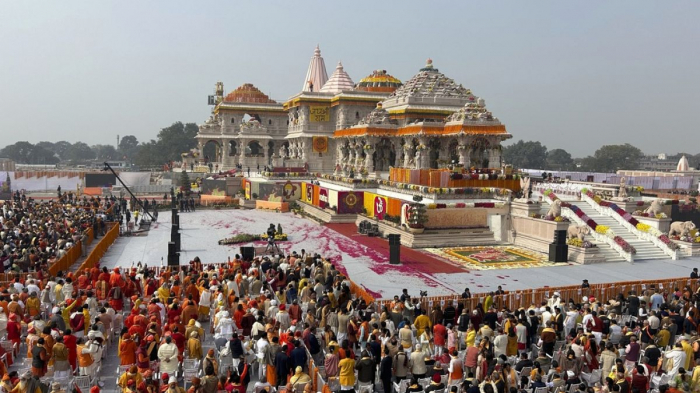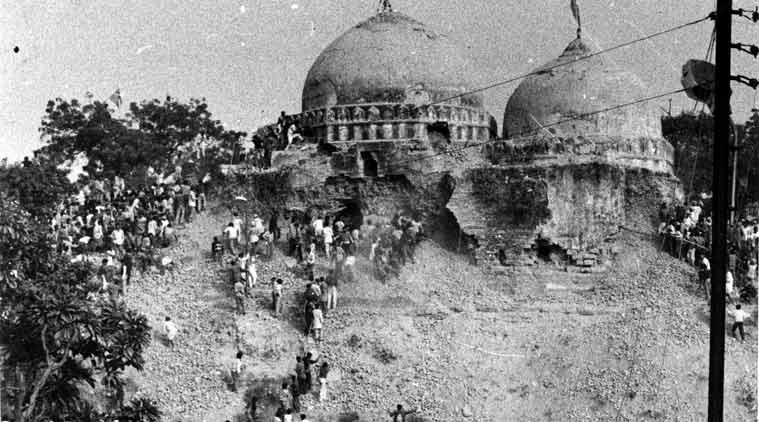ANALYTICS
24.01.24 14:20

The inauguration of the Ram Mandir temple in Ayodhya, Uttar Pradesh, by Indian Prime Minister Narendra Modi on 22 January 2024 has reignited discussions about the alleged 'tolerance' in the world's largest democracy. The temple was built on the site of a mosque that was destroyed by Hindu radicals in 1992. The destruction of the mosque at that time resulted in nationwide riots and the violent deaths of over 2,000 Muslims. This event marked a turning point in Indian politics and deepened sectarian tensions in the country.

The mosque in ruins was constructed in 1527 under the direction of Babur, the inaugural Mughal emperor. It was one of the largest mosques in Uttar Pradesh, a state with a Muslim population of 31 million.
At the time, Indian authorities expressed only regret, and almost none of the participants, including the organizers of the massacre of Muslims, were punished. The Ayodhya Muslim community was denied permission to restore their mosque. Instead, they were given a plot of land as compensation to build a new mosque elsewhere.
Additionally, the opening of the Hindu temple was celebrated, which Christians view as paganism and idolatry. More than 8,000 politicians, diplomats, film and pop stars, and hundreds of thousands of pilgrims who flocked to the city attended the ceremony. In connection with the opening of the temple in Ayodhya, many states of India declared Monday a day off. In Uttar Pradesh, all schools and educational institutions were closed.
Modi's supporters on the extreme right saw the Indian prime minister's decision as a way of asserting the dominance of Hindus as the main religious group in India. However, many Muslims, Christians, and moderate Hindus viewed the grand opening of a Hindu temple on the site of a demolished mosque as an insult to the 200 million-strong community of Indian Muslims, as well as to all non-Hindus, including Indian Christians. In an article for Scroll, Indian historian Ramachandra Guha described the event as evidence of Modi's sectarianism, stating that it is a sign that India is increasingly becoming a Hindu-first country.
It is noteworthy that there was no objection or even concern expressed about the demonstrative humiliation of Indian Muslims from Tehran. However, it is widely known how the authorities of the Islamic Republic of Iran 'protect' Muslims. It should be noted that the ayatollahs in Tehran supported the regime in Yerevan, which illegally occupied Azerbaijani lands and expelled over 200,000 Muslims from the Republic of Armenia and over 1 million Muslims from the occupied Karabakh. Tehran did not object to the destruction and desecration of mosques in both the Republic of Armenia and occupied Karabakh.
Tehran plays a significant role in the military cooperation between New Delhi and Yerevan. Arms supplies from India to the Republic of Armenia flow through Iranian territory.
In Armenia, India is now seen as the second most important ally among revanchists, after France. Analogous to the Soviet-era slogan 'Hindi Rusi bhai bhai' (meaning 'Hindus and Russians are brothers'), Hayastan nationalists have adopted the slogan 'Hindi Hayi bhai bhai bhai'. However, the 'Christian solidarity' that was previously emphasised in this 'brotherhood' is no longer highlighted in the current era of 'brotherhood and friendship with Russia'. This change is not accidental.
In India, both Christians and Muslims face persecution and discrimination.
Hindu politicians have been involved in scandals over extremist anti-Christian and anti-Muslim statements. Hindu extremists express concern about the higher birth rates among Muslims and Christians compared to Hindus. In 2015, representatives of the far-right Shiv Sena party called for forced sterilisation of Christians and Muslims living in the country in order to reduce their numbers. Sadhvi Diwa Thakur, vice-president of the Hindu Maha Sabha party, stated that the increase in the number of Christians and Muslims was allegedly 'threatening' Hindus, effectively calling for genocide on religious grounds. Additionally, the Shiv Sena has called for the disenfranchisement of Muslim Indians. In India, some far-right Hindu politicians have called for measures against Muslims and Christians that are reminiscent of those employed by the Nazis in Hitler's Germany. It is concerning that these facts have not garnered more attention from the international community.
However, there has been a long-standing policy of sterilisation in India that has disproportionately affected Christians and Muslims. This policy has been criticised for its potential genocidal implications. During the state of emergency declared in 1975, Prime Minister Indira Gandhi declared that the state needed to reduce the birth rate by any means necessary, even if it meant restricting personal rights. It is important to note that this policy was not limited to any particular religious group. Millions of Indian citizens were subjected to forced sterilisation. The sterilisation was primarily applied to the socially disadvantaged strata of the population, including Muslims and Christians who often belonged to the lowest castes and tribes, which had the status of outcasts in Hindu society. Sterilisation campaigns are ongoing in India, and the authorities are enforcing sterilisation policies primarily against Christian and Muslim minorities.
Violence against Muslims in India has become a habitual phenomenon since India's separation from Pakistan, including mass killings and pogroms. The same persecution is also observed towards Christians. It is important to note that this information is presented objectively and without bias.
In 2008, the north-eastern Indian state of Orissa experienced a wave of violence that was anti-Christian. The violence was triggered by the murder of Hindu nationalist leader Swami Lakshmananda Saraswati. The local Christian community was accused of the murder, as Saraswati had been injured a year earlier in clashes with Christians that he had provoked. As a result, Hindu extremists burned Christian churches and forced thousands of Christians out of their homes. Approximately 60 Christians were killed and 25,000 were left homeless as a result of the pogroms, during which they were humiliated and beaten.
On 23 January 1999, in Orissa, a Hindu extremist burned Australian missionary Graham Staines and his two sons alive in a car.
According to a report by Aid to the Persecuted, released on 28 July 2020, the number of crimes against Christians in India rose by 40.87% in that year. Founder Shibu Thomas explains that these figures are just the tip of the iceberg, as many people do not report attacks for fear of punishment or the bureaucratic machine. On 22 January 2024, Prime Minister Modi inaugurated a Hindu temple on the site of a demolished mosque in Uttar Pradesh.
In 2020, attacks against Christians in India were reported in 22 out of 28 states, with the most attacks occurring in the populous state of Uttar Pradesh. These attacks included murders, rapes, social rejection, threats, beatings, burning of houses and temples, and bans on sharing water sources. Jharkhand, Orissa, and Chhattisgarh are considered the most dangerous states for Christians. This is due to the fact that many Christians in these states belong to the so-called untouchables and tribals.
In 2023, Manipur witnessed violent attacks and killings of Christians in India. Extremists killed over 130 Christians, burning many of them alive in churches or their homes.
Thus, it appears that politicians in the Republic of Armenia, which positions itself as the first Christian country in the world, are placing their hopes on a country where violence against Christians is most prevalent. Meanwhile, the Indian authorities are accused of pursuing a policy of discrimination and humiliation, not only against Muslims but also against Christians. This is exemplified by the recent opening of a Hindu temple on the site of a destroyed mosque.
Alexander Gedevanov
Read: 658
Write comment
(In their comments, readers should avoid expressing religious, racial and national discrimination, not use offensive and derogatory expressions, as well as appeals that are contrary to the law)
News feed
-
Georgian Defence Minister highlights “active” cooperation with US Defence Department
18:0026.07.24
-
Georgian PM says rehabilitation of historical Leuville Estate to conclude in 2026
17:1226.07.24
-
Culture Minister expects Georgian flag to fly, anthem played many times in Paris
16:4126.07.24
-
16:1026.07.24
-
Irakli Kobakhidze on terrorism threats: We have all the resources to oppose such plans
15:3826.07.24
-
15:0026.07.24
-
Speaker: Opposition's main goal to come into power, be puppet regime ruled by foreign forces
14:1026.07.24
-
Two missing citizens found in Svaneti
13:2726.07.24
-
13:0026.07.24
-
Georgia Global Utilities announces issuance of $300 Million Green Bonds
12:1726.07.24
-
Can Abkhazians calm down now that the law on housing in Abkhazia has been withdrawn?
11:4026.07.24
-
PM attends Sports Summit and a Reception in Paris
11:0026.07.24
-
NBG Acting President attends opening ceremony of 1st Authorised Investment Fund in Georgia
10:0526.07.24
-
18:0025.07.24
-
17:3025.07.24
-
Georgian passport advances 6 positions in int’l ranking on visa-free travel
16:4825.07.24
-
Georgian PM says “accelerating” economic growth Govt’s “most important national task”
16:0525.07.24
-
Media representatives were attacked while performing their professional duty in Tbilisi
15:3025.07.24
-
Levan Davitashvili: The construction partner of Anaklia port will be announced tomorrow
14:5025.07.24
-
NBG: National currency loans up by 785.90 million GEL, foreign currency by 180.28 million GEL
14:0525.07.24
-
13:3025.07.24
-
12:4825.07.24
-
Defense Minister: Increasing funding annually to strengthen defense capabilities
12:0325.07.24
-
11:3425.07.24
-
11:0525.07.24
-
10:2825.07.24
-
Iago Khvichia - The investigation started in SSS is based on conspiracy theories
18:0024.07.24
-
Until July 28, there will be occasional rainy weather in Georgia
17:3324.07.24
-
NDI is launching a long-term assessment mission for the 2024 parliamentary elections
17:0024.07.24
-
16:3524.07.24
-
Kakha Okriashvili about GD - Double and triple play will lead to war
16:0124.07.24
-
15:3024.07.24
-
Occupiers will 'burn' Abkhazians 'with a hot iron' for their 'Russophobia
14:5524.07.24
-
State Budget Received Record Revenue From Gasoline And Diesel Excise Tax
14:1024.07.24
-
13:0124.07.24
-
12:4124.07.24


